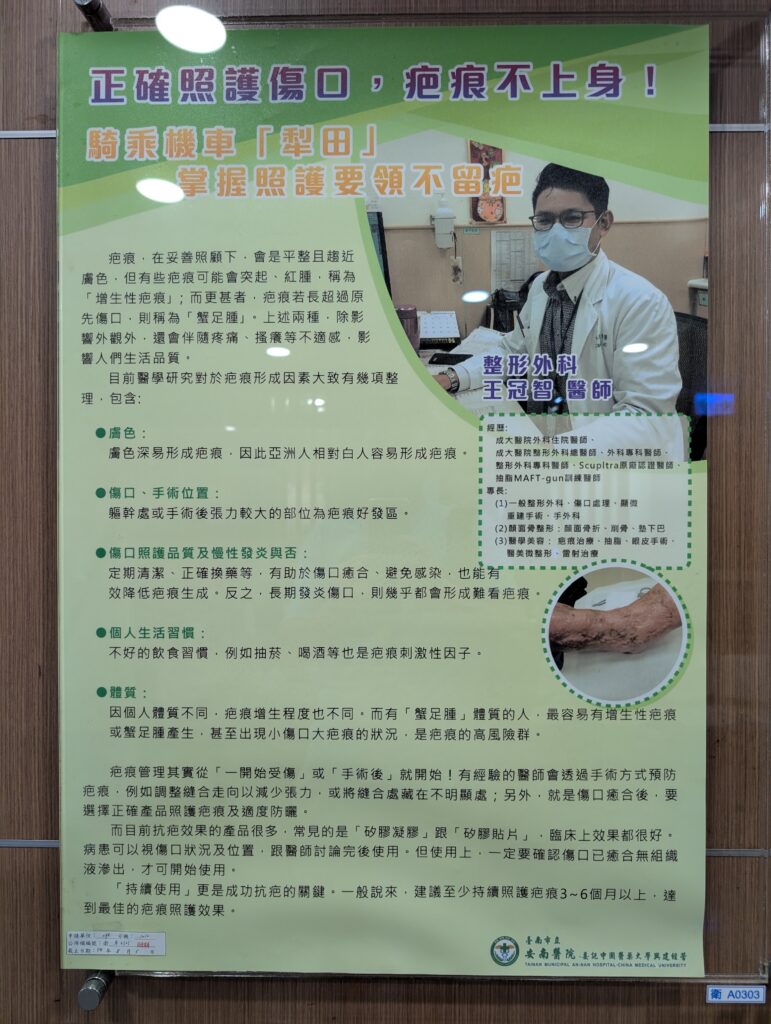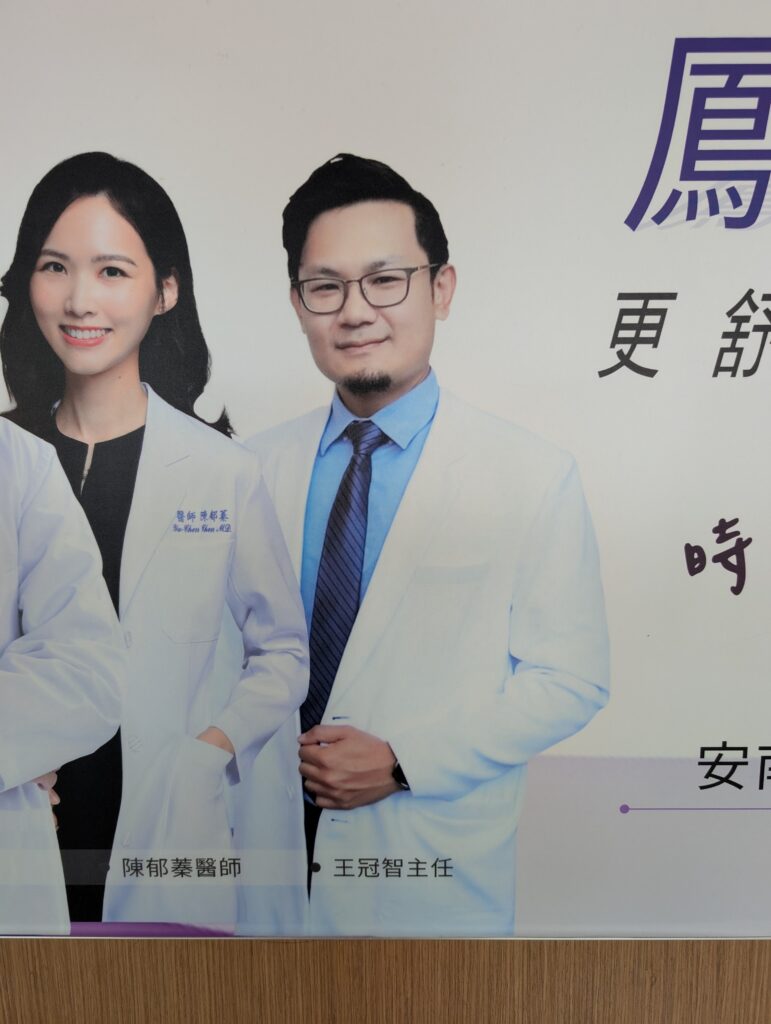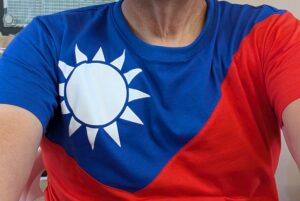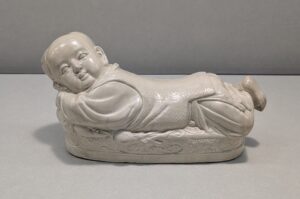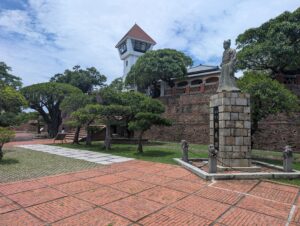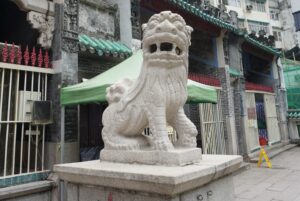Taiwan Health Care
Unintentional Medical Tourism
I was distracted through much of my early time in Taiwan by a cut that developed an infection. My body produces lipomas, fatty tumors that are not dangerous, but ugly. Doctors tend not to want to remove these because they are benign, but I don’t like them and have removed them myself from time to time. In a relatively unwise decision, I decided to remove two of my larger ones the day before we left Texas for California. I bought a sterilized livestock scalpel from Tractor Supply. I rubbed the area off with alcohol and made the cuts without anesthesia. I had learned a few things from doing this before, as to which direction the cuts should be made to reduce bleeding and scarring. The scalpel was very sharp, and the cuts therefore not painful. I made the incisions as small as I could, then squeezed the lipomas up through the skin, so as not to be fishing around creating more chances to infect the wound.
I successfully extracted the tumors on May 22nd, one on the inside of my left leg, and one right on the front of my abdomen. The abdominal tumor was particularly annoying as it was sometimes noticeable even when I was wearing a shirt. The abdominal tumor turned out to extend a bit deeper than I expected. It was larger than a golf ball! Tractor supply sells dissolvable sutures, in case a larger wound needs to be closed up. In the past, I had just used super glue to close the incision, and that’s what I did this time.
I continued to exercise as normal, and really had no signs of any problems for over two weeks. On about the fifth or sixth of June, the super glue opened up a bit. I assumed this was just natural, and that the scab was coming off. There was at this time, however, a very small amount of clear liquid discharging from the abdominal incision, and it had a slight odor. It also was a bit itchy. To add injury to injury, some of the lower quality bandages I had used had caused significant irritation and had been more painful than the wound. I unsuccessfully tried to glue it back together.
The first morning after I arrived in Taiwan, the Wangs had helped me arrange to receive a Japanese Encephalitis vaccination at a local hospital in Taipei. This vaccination is recommended for travelers who will be outside a lot in East Asia. Japanese Encephalitis is transmitted by mosquitoes that have bitten infected swine. The odds of getting the disease are one in a million, but if you get it, there is about a one in three chance it will be fatal and another one in three that you will have long term medical aftereffects. The problem is that in the United States, this requires two vaccinations spaced out by a month, and the vaccination series has a total cost of $840. This seems like expensive insurance for a disease with such long odds of acquisition, especially considering most of my time was likely to be spent in areas without infected swine.
On the other hand, I had learned that in most parts of the world, people receive a single, live vaccination for the same disease that is apparently more effective. Taiwan has state funded medical care which makes the vaccination almost free. But even without the subsidy, foreigners can pay cash for the shot. You can take care of this in a single visit for less than $100! That sounded like cheap insurance against a disease with potentially very dangerous effects. Thanks to the Wangs, I was able to get this done the morning after my arrival. I experienced no negative side-effects, and gained confidence in the Taiwanese medical system. I was amazed at the cost difference.
Due to jet lag, I woke up extremely early my first several days in Taiwan. I was slated to do some activities with the Wangs on Sunday, June 8th, but not until 9:30. I was up by 4:00. I decided to have a 24 hour urgent care center look at my infected cut. I walked to one in my neighborhood, which turned out not to be as 24 hour as advertised. The hospital I had visited also claimed to be 24 hours, so I Ubered back there, hoping my previous interaction would at least help some if the admission process was complicated. Only the ER was open. The ER doctor did not really want to see me, and just directed me to a larger nearby hospital. At least it was within walking distance.
The larger hospital ER was open, and had a very young English speaking doctor. He looked at my wound and confirmed it was infected. Like just about every doctor who I told about my situation, he was fascinated by my self-surgery. He cleaned it out, gave me three days worth of antibiotics, and told me to come back Wednesday. My hope was that I could get it sutured up, if not Sunday, at least on the follow up. The cost of this visit was again less than $100, including registration and medications.
Unfortunately, the follow up doctor’s advice on Wednesday was not as sound. He just gave me some antibiotic cream, and wanted me to change the dressing 2-3 times a day until the wound healed form the inside. That was going to be very inconvenient, but not necessarily dangerous. What concerned me was that he did not renew my antibiotic prescription. I had never been assigned oral antibiotics for just three days, and was concerned that the infection would return and become resistant. I paid my $60, and was off on a train to Tainan.
Fortunately for me, one of my Servas hosts in Tainan was a gynecologist. I knew she would have enough medical knowledge to at least answer my question about the antibiotics. Perhaps she could even help me acquire an extended supply if I needed them. She insisted on taking a look at the wound. I expressed to her that I had hoped to have it sutured up, thinking that would be safer and cleaner.
One of her medical classmates was a plastic surgeon in a different hospital in Tainan. She really went to bat for me and arranged a space available appointment at the end of the visit window the following morning. Dr. Wang, the plastic surgeon, asked at the appointment if I would be busy later. I answered a little vaguely, not knowing how much later he meant, but being willing to do whatever I needed to for the matter to be taken care of. He meant, what was I doing in an hour or so! I walked around the hospital for a bit, then had an outpatient debriding surgery that very afternoon. With noticeable embarrassment, he told me he thought it might cost as much as NT$5,000, and asked if that was OK. That’s $166, US. I would have thought it was a bargain for ten times that cost. I answered in the affirmative with elated gratitude. I instantly felt relief.
The surgery was a bit more painful than I expected, but Dr. Wang used three layers of stitches to close my wound after removing a bit of material around the edges so the skin would heal together more successfully. He put in two layers of dissolvable interior stitches, and six surface stitches. He prescribed me some pain medication, antibacterial ointment, and some steroid cream for where the cheaper bandages had caused so much skin irritation. I took a little bit of the acetaminophen the first day, but had no further need of it thereafter.
The three day supply of antibiotics I was given by the first ER doctor was likely a cost cutting measure, and the advice to let the wound heal from the inside I got on the follow up was probably not the best available option. The smooth and inexpensive Japanese Encephalitis vaccination and the debriding operation were brilliant and shockingly inexpensive. It was all inexpensive. All told, I can only give glowing reports of the Taiwanese medical system, as I experienced it. The treatment is so inexpensive that as an informed patient, if I didn’t like the advice or treatment, I could just go find someone else. That seemed like a reasonable trade-off, one that is a lot more manageable than a system where I end up cutting out my own tumors because doctors either will not do it, or will delay me for years, or charge so much as to make professional treatment impractical. I can understand why people become “medical tourists.” I also understand why some would not have the highest confidence. On the whole, though, the doctors I met seemed professional and competent. Some just had different ideas about treatment. Ultimately, I was able to sift through the available options and get what I needed done accomplished with the help of great new friends and medical professionals.
I will now always be able to tell my friends, “I am really glad I went to see my gynecologist.”
